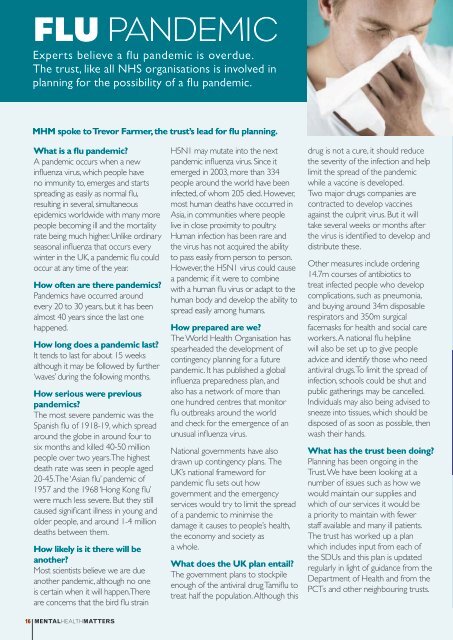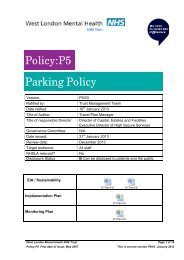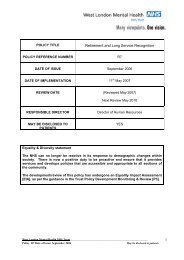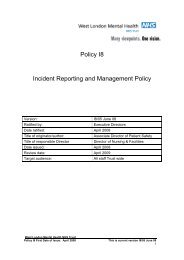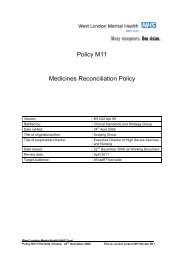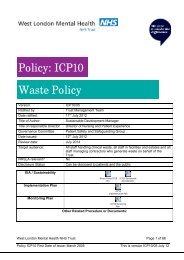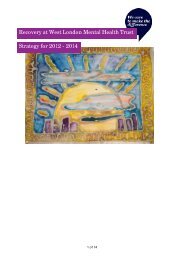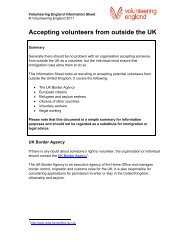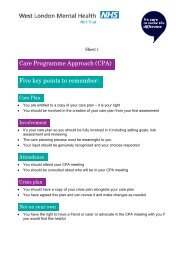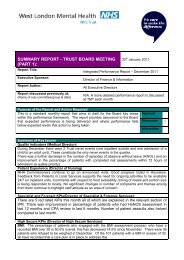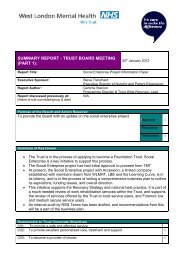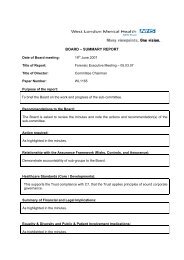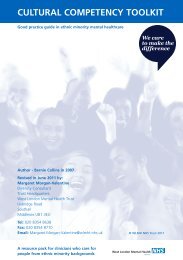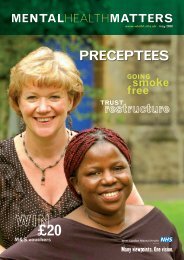children - West London Mental Health NHS Trust
children - West London Mental Health NHS Trust
children - West London Mental Health NHS Trust
You also want an ePaper? Increase the reach of your titles
YUMPU automatically turns print PDFs into web optimized ePapers that Google loves.
FLU pandemic<br />
Experts believe a flu pandemic is overdue.<br />
The trust, like all <strong>NHS</strong> organisations is involved in<br />
planning for the possibility of a flu pandemic.<br />
Clinical<br />
Focus<br />
MHM spoke to Trevor Farmer, the trust’s lead for flu planning.<br />
What is a flu pandemic?<br />
A pandemic occurs when a new<br />
influenza virus, which people have<br />
no immunity to, emerges and starts<br />
spreading as easily as normal flu,<br />
resulting in several, simultaneous<br />
epidemics worldwide with many more<br />
people becoming ill and the mortality<br />
rate being much higher. Unlike ordinary<br />
seasonal influenza that occurs every<br />
winter in the UK, a pandemic flu could<br />
occur at any time of the year.<br />
How often are there pandemics?<br />
Pandemics have occurred around<br />
every 20 to 30 years, but it has been<br />
almost 40 years since the last one<br />
happened.<br />
How long does a pandemic last?<br />
It tends to last for about 15 weeks<br />
although it may be followed by further<br />
‘waves’ during the following months.<br />
How serious were previous<br />
pandemics?<br />
The most severe pandemic was the<br />
Spanish flu of 1918-19, which spread<br />
around the globe in around four to<br />
six months and killed 40-50 million<br />
people over two years. The highest<br />
death rate was seen in people aged<br />
20-45. The ‘Asian flu’ pandemic of<br />
1957 and the 1968 ‘Hong Kong flu’<br />
were much less severe. But they still<br />
caused significant illness in young and<br />
older people, and around 1-4 million<br />
deaths between them.<br />
How likely is it there will be<br />
another?<br />
Most scientists believe we are due<br />
another pandemic, although no one<br />
is certain when it will happen. There<br />
are concerns that the bird flu strain<br />
H5N1 may mutate into the next<br />
pandemic influenza virus. Since it<br />
emerged in 2003, more than 334<br />
people around the world have been<br />
infected, of whom 205 died. However,<br />
most human deaths have occurred in<br />
Asia, in communities where people<br />
live in close proximity to poultry.<br />
Human infection has been rare and<br />
the virus has not acquired the ability<br />
to pass easily from person to person.<br />
However, the H5N1 virus could cause<br />
a pandemic if it were to combine<br />
with a human flu virus or adapt to the<br />
human body and develop the ability to<br />
spread easily among humans.<br />
How prepared are we?<br />
The World <strong>Health</strong> Organisation has<br />
spearheaded the development of<br />
contingency planning for a future<br />
pandemic. It has published a global<br />
influenza preparedness plan, and<br />
also has a network of more than<br />
one hundred centres that monitor<br />
flu outbreaks around the world<br />
and check for the emergence of an<br />
unusual influenza virus.<br />
National governments have also<br />
drawn up contingency plans. The<br />
UK’s national frameword for<br />
pandemic flu sets out how<br />
government and the emergency<br />
services would try to limit the spread<br />
of a pandemic to minimise the<br />
damage it causes to people’s health,<br />
the economy and society as<br />
a whole.<br />
What does the UK plan entail?<br />
The government plans to stockpile<br />
enough of the antiviral drug Tamiflu to<br />
treat half the population. Although this<br />
drug is not a cure, it should reduce<br />
the severity of the infection and help<br />
limit the spread of the pandemic<br />
while a vaccine is developed.<br />
Two major drugs companies are<br />
contracted to develop vaccines<br />
against the culprit virus. But it will<br />
take several weeks or months after<br />
the virus is identified to develop and<br />
distribute these.<br />
Other measures include ordering<br />
14.7m courses of antibiotics to<br />
treat infected people who develop<br />
complications, such as pneumonia,<br />
and buying around 34m disposable<br />
respirators and 350m surgical<br />
facemasks for health and social care<br />
workers. A national flu helpline<br />
will also be set up to give people<br />
advice and identify those who need<br />
antiviral drugs. To limit the spread of<br />
infection, schools could be shut and<br />
public gatherings may be cancelled.<br />
Individuals may also being advised to<br />
sneeze into tissues, which should be<br />
disposed of as soon as possible, then<br />
wash their hands.<br />
What has the trust been doing?<br />
Planning has been ongoing in the<br />
<strong>Trust</strong>. We have been looking at a<br />
number of issues such as how we<br />
would maintain our supplies and<br />
which of our services it would be<br />
a priority to maintain with fewer<br />
staff available and many ill patients.<br />
The trust has worked up a plan<br />
which includes input from each of<br />
the SDUs and this plan is updated<br />
regularly in light of guidance from the<br />
Department of <strong>Health</strong> and from the<br />
PCTs and other neighbouring trusts.<br />
Safeguarding <strong>children</strong><br />
is everyone’s business<br />
WLMHT is a child friendly<br />
organisation. There are policies in<br />
place at the trust to make sure we<br />
are providing good quality care<br />
for service users and this includes<br />
safeguarding their <strong>children</strong> and<br />
family. Children are welcome to<br />
visit inpatients, provided the visit<br />
is in their interests, and the trust<br />
has been working to increase the<br />
number of child visiting rooms and<br />
to improve the ones already in place.<br />
Cressida Zielinski, the trust’s<br />
named nurse for child protection<br />
says, “The needs of <strong>children</strong> must<br />
be paramount, even if you are<br />
working with adult service users.<br />
It is crucial that you find out from<br />
service users if they are responsible<br />
for any <strong>children</strong>. If a parent is<br />
hospitalised you need to think<br />
about any <strong>children</strong> and the impact<br />
this might have on them.<br />
“Staff must share all information<br />
or concerns they may have about<br />
<strong>children</strong> so that we are all working<br />
in their best interests. It is for this<br />
reason that the trust has built up<br />
robust connections with our local<br />
authorities.”<br />
Dr Clare Lucey has taken on the new role of trust wide named doctor for<br />
safeguarding <strong>children</strong> and she will be supported by a local named doctor<br />
from each of the SDUs. Once these appointments are made they will be<br />
publicised. Dr Lucey says, “Safeguarding <strong>children</strong> is a crucial component<br />
of delivering safe effective services in the trust. This has been recognised<br />
through our named professionals, clinical leads, awareness training at<br />
induction, the introduction of mandatory training, regular clinical audits and<br />
a focus on building a supportive structure for good quality child visiting.”<br />
“<br />
If you have<br />
a concern about a<br />
child doing nothing<br />
is not an option.<br />
”<br />
Lord Lamming<br />
New safeguarding <strong>children</strong><br />
governance structure<br />
The trust has recently reviewed its<br />
safeguarding <strong>children</strong> governance<br />
structure to bring it into line<br />
with the restructure of the trust.<br />
afeguarding <strong>children</strong> is now on<br />
the agenda of each of the SDUs to<br />
make sure it is an integral part of<br />
all clinical work done.<br />
For more detailed information please see<br />
the safeguarding <strong>children</strong> section on the<br />
Exchange which can be found under <strong>Trust</strong>wide<br />
Information which is on the home page.<br />
16 MENTALHEALTHMATTERS MENTALHEALTHMATTERS 17


